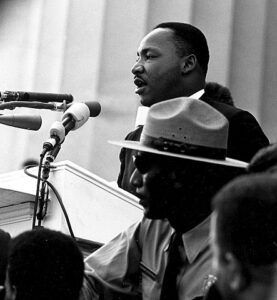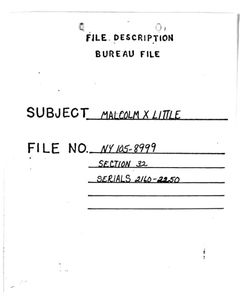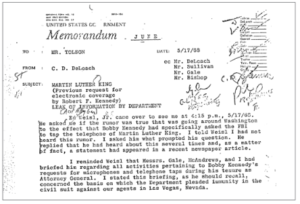Tag: FBI
Primary Source: FBI Files on Martin Luther King, Jr.

Full text access to the FBI’s file on the assassination of Martin Luther King, Jr. is available on the GALE platform. “The 44,000-page case file … documents the bureau’s role in finding Ray and obtaining his conviction. The file also includes background information amassed by the FBI on Dr. King’s social activism.”
Black Freedom Struggle in the 20th Century: Federal Government Records, on the Proquest platform, includes the two FBI files on Martin Luther King, Jr. Part 1
“details the heavy surveillance and painful harassment that J. Edgar Hoover’s FBI directed against America’s foremost civil rights leader throughout the 1960s.” Part 2 consists of verbatim transcripts and detailed summaries of telephone conversations between King and one of his most trusted confidants, Stanley D. Levinson.
Primary Sources: Federal Surveillance of African Americans, 1920-1984
 “Throughout the twentieth century Black Americans of all political persuasions were subject to federal scrutiny, harassment, and prosecution. The Federal Bureau of Investigation enlisted black “confidential special informants” to infiltrate a variety of organizations. Hundreds of documents in this collection were originated by such operatives. The reports provide a wealth of detail on “Negro” radicals and their organizations. In addition to infiltration, the FBI contributed to the infringement of First Amendment freedoms by making its agents a constant visible presence at radical rallies and meetings. This archive is based on original microfilm.”
“Throughout the twentieth century Black Americans of all political persuasions were subject to federal scrutiny, harassment, and prosecution. The Federal Bureau of Investigation enlisted black “confidential special informants” to infiltrate a variety of organizations. Hundreds of documents in this collection were originated by such operatives. The reports provide a wealth of detail on “Negro” radicals and their organizations. In addition to infiltration, the FBI contributed to the infringement of First Amendment freedoms by making its agents a constant visible presence at radical rallies and meetings. This archive is based on original microfilm.”
It contains the FBI files on A. Philip Randolph, Adam Clayton Powell, the Atlanta Child Murders, the Black Panther Party-North Carolina, the Committee for Public Justice, Elijah Muhammed, the Highlander Folk School, the Ku Klux Klan Murder of Viola Liuzzo, Malcolm X, MIBURN (Mississippi Burning), the Moorish Science Temple of America, the Murder of Lemuel Penn, Muslim Mosque, Inc., the NAACP, the National Negro Congress, the Organization of Afro-American Unity, Paul Robeson, the Reverend Jesse Jackson, Roy Wilkins, the Student Nonviolent Coordinating Committee, Thurgood Marshall, W.E.B. Du Bois, Communist Infiltration of the Southern Christian Leadership Conference, and Marcus Garvey.
Primary Sources: FBI Confidential Files and Radical Politics in the U.S., 1945-1972
 Another recent acquisition of the Library is the ProQuest History Vault module, FBI Confidential Files and Radical Politics in the U.S., 1945-1972. Under the leadership of J. Edgar Hoover, the FBI vigorously investigated and tracked the activities of Communist groups, Communist-front groups, and other radical organizations in the U.S. This module consists of records of the FBI and the Subversive Activities Control Board from 1945-1972.
Another recent acquisition of the Library is the ProQuest History Vault module, FBI Confidential Files and Radical Politics in the U.S., 1945-1972. Under the leadership of J. Edgar Hoover, the FBI vigorously investigated and tracked the activities of Communist groups, Communist-front groups, and other radical organizations in the U.S. This module consists of records of the FBI and the Subversive Activities Control Board from 1945-1972.
Highlights of this module include J. Edgar Hoover’s office files; documentation on the FBI’s so-called “black bag jobs,” as they were called before being renamed “surreptitious entries”; and the “Do Not File” File. The “Do Not File” file consists of records that were originally supposed to be destroyed on FBI Director J. Edgar Hoover’s order, however, through both intended and inadvertent exceptions to this order, large portions of these files survived. Another key collection in this module consists of the records of the Subversive Activities Control Board (SACB). The SACB files constitute one of the most valuable resources for the study of left-wing radicalism during the 1950s and 1960s.